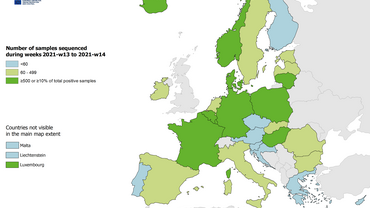COVID-19 vaccination
Safe and effective COVID-19 vaccines are a powerful tool for ensuring public health and controlling the pandemic. Results from observational studies carried out to date have shown that the vaccines authorised in the EU/EEA are currently highly protective against severe COVID-19, hospitalisation and death.
The European Medicines Agency (EMA) evaluates COVID-19 vaccines, using the same high standards as those applied to all other vaccines, before they are authorised for use in the EU by the European Commission. EMA also monitors any side effects and adverse reactions in people who have received COVID-19 vaccines.
Following the deployment of COVID-19 vaccines, observational studies collect data on how effective they are in real life, making it possible to monitor how the vaccines work once administered to the population. Since the vaccines began being administered studies have been ongoing in the EU/EEA (including some funded by ECDC) and in other parts of the world.
ECDC works closely with the EU/EEA countries and the European Commission to monitor the roll-out of COVID-19 vaccines, provide regular overviews of vaccination deployment strategies and plans, and facilitate dialogue and technical exchanges between countries via the EU/EEA Collaboration of National Immunisation Technical Advisory Groups (NITAGs) coordinated by the Centre. In addition, the Centre regularly updates its technical advice to inform COVID-19 vaccination strategies in EU/EEA countries.
Vaccination roll-out and progress tracker
Since COVID-19 vaccines were given conditional marketing authorisation and deployed in the EU/EEA, vaccination campaigns have been ongoing in all countries. To keep track of the progress of vaccination efforts across the EU/EEA, ECDC has set up a monitoring system for the collection of key vaccine roll-out indicators. These data are publicly available through the COVID-19 Vaccine Tracker, an interactive dashboard providing the latest data reported by EU/EEA countries.
Evidence to inform decision making
ECDC reviews scientific evidence and develops relevant technical guidance on COVID-19 vaccines that can inform national priorities and decision-making. As the vaccine roll-out progresses, there is a need to review the evolving evidence on topics such as use of COVID-19 vaccines in populations that have already had the disease, the possibility of using different vaccine products for the first and second dose, evidence on the need for boosters or additional vaccination in populations that have completed the primary vaccination course, and vaccination of children. ECDC therefore regularly publishes reports summarising the evidence available on COVID-19 vaccines and provides options for consideration by national public health authorities.
Monitoring of vaccine effectiveness, impact and safety
Once vaccines have been rolled out in the population, they are continuously monitored. Assessing the effectiveness, safety and impact of COVID-19 vaccines is the key to ensuring that they function as expected, picking up any possible safety signals and providing information if vaccination strategies need to adapted.
The EU Commission Communication of 15 October 2020 outlined future joint work by the European Medicines Agency (EMA) and ECDC to prepare for participation in large-scale EU-wide effectiveness and safety monitoring studies of COVID-19 vaccines.
In accordance with their mandates, ECDC has taken the lead on COVID-19 vaccine effectiveness studies and EMA is monitoring vaccine safety.
The data collected will allow action to be taken where needed and vaccination strategies to be fine-tuned, as well as being used to inform and reassure the public. Post-authorisation monitoring of vaccines is a normal practice and has been carried out in the past, both at country and EU level. ECDC has extensive experience in this field and has performed vaccine effectiveness studies with a broad geographical representation over the last decade, mostly focusing on the seasonal influenza, pneumococcal and pertussis vaccines.
ECDC is working on the establishment of an infrastructure to allow for the monitoring and analysis of COVID-19 vaccine effectiveness over time, using a multi-country approach, by implementing studies in different settings. Results of the studies will be published periodically.
Facilitating vaccine acceptance and uptake
The acceptance and uptake of the vaccines by the population is the key to a successful COVID-19 vaccination programme. Barriers to uptake need to be identified and there is a need to understand and properly address individuals’ and communities’ beliefs, concerns and expectations regarding the vaccines and the disease. ECDC supports EU/EEA countries in the development of strategies to promote vaccine acceptance and uptake by focussing on areas such as behavioural aspects related to vaccine acceptance, the challenges posed by misinformation on vaccines, and possible interventions to increase vaccine uptake in socially vulnerable population groups.
Prioritisation of target groups for vaccination
Before introducing the COVID-19 vaccines, it was important to carefully plan and prioritise the target groups for vaccination. This is because the scope of COVID-19 vaccination campaigns was unprecedented, the production and roll-out of vaccines takes time and resources and, early in the campaigns, scientific knowledge regarding the impact of vaccination was limited, as was the supply of vaccines. In the first phases of vaccination, the main objectives were to reduce mortality and morbidity in those populations most at risk and to improve the resilience of health systems.
During the initial phases of vaccine rollout in the EU/EEA, those groups prioritised for COVID-19 vaccination included elderly people (with the lower age limit varying among countries); residents and personnel in long-term care facilities; healthcare workers; social care personnel; and people with health conditions making them vulnerable to severe disease. Some countries also prioritised workers in essential public services. As the vaccine roll-out progressed, countries gradually extended vaccination to younger age groups. This later also included adolescents and children, once specific vaccines for use in these age groups had been approved in the EU/EEA.
National vaccine deployment planning in EU/EEA
Strategic and adaptable planning has been key to managing the unprecedented task of rolling out COVID-19 vaccination across large populations, with several vaccines involving different logistical requirements and, in certain situations, against the background of limited supply. ECDC supported this endeavour by regularly capturing information on the roll-out to enable knowledge sharing on challenges, good practices and lessons learned while implementing national deployment plans in the EU/EEA.
Vaccination preparedness and stress-test exercises
The successful deployment of COVID-19 vaccines and their roll-out on a national scale involved complex logistics to ensure that infrastructure was in place, supported by an adaptable strategy, planning and communication.
To support preparedness for COVID-19 vaccine deployment, ECDC organised short and focused simulation exercises on the readiness of participating Member States. These exercises sought to understand if there were mechanisms in place to coordinate the vaccination campaign, with clear lines of command, processes for receiving, storing and allocating vaccines to vaccination sites. It also aimed to determine whether a vaccination delivery strategy had been devised, along with proactive and reactive communication plans.
The aim of this ‘stress test’ exercise was to assist participants in assessing their preparedness for the deployment of vaccines and identifying gaps and follow-up actions.
EU/EEA NITAGs collaboration on vaccination strategies
Information sharing and collaboration is taking place among national bodies and expert groups that provide evidence-based recommendations for decisions on COVID-19 vaccines and vaccination in EU/EEA countries. This is being coordinated by ECDC and the EU/EEA National Immunisation Technical Advisory Groups (NITAGs) Collaboration.






